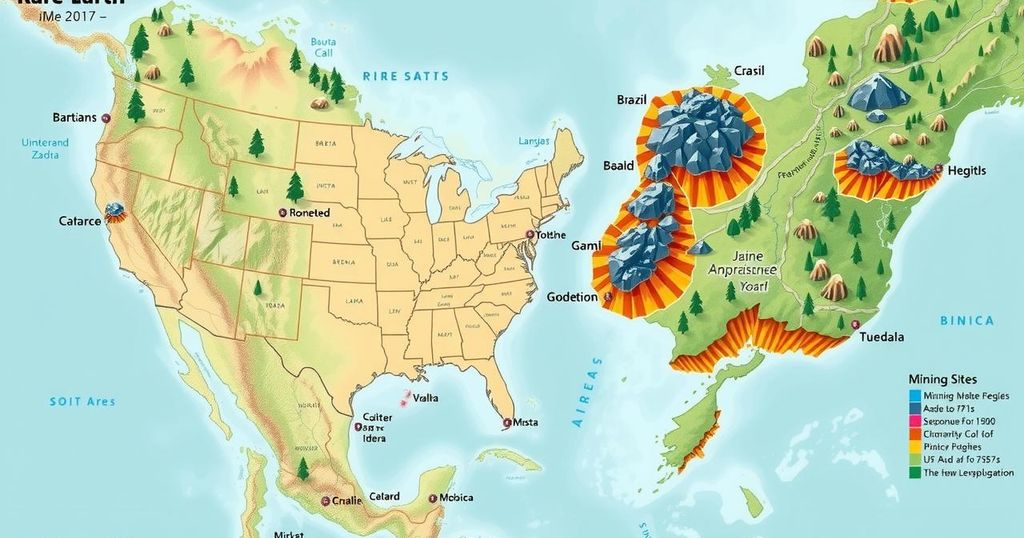Emergence of Rare-Earth Plants Beyond China: U.S. and Brazil Lead the Charge
The U.S. and Brazil are significantly ramping up their rare earth extraction and processing activities to reduce dependence on China. Companies like Aclara Resources are paving the way for mining operations while dealing with challenges like high costs and environmental regulations. The geopolitical landscape is propelling this shift, as demand for these minerals increases, especially in the technology sector.
As the global race for rare earth elements escalates outside of China, the United States and Brazil are investing heavily in mining and refining operations. Both countries aim to bolster their capacities for extracting critical metals essential for electric vehicles and smartphones, redirecting their supply chains away from China, which currently dominates approximately 70% of global rare earth mining.
China’s firm grip on rare earth processing—reported to be around 90% of the total worldwide—has heightened the urgency for other nations to secure alternative sources. Ramón Barúa, the chief executive of Canada’s Aclara Resources, noted, “China is a formidable competitor.” Aclara is gearing up to open a mine that will feed a new processing plant it plans to establish in the U.S. by August. This facility will focus on separating rare earth deposits into individual elements, vital for many tech applications.
Notably, Aclara has sealed an agreement to supply rare earths to VAC, a German corporation receiving $94 million from the Pentagon to develop a factory in South Carolina. This facility intends to produce magnets for clients, notably General Motors. Barúa remarked that this situation presents “a tsunami of demand” as geopolitical tensions have intensified the need for reliable sources of these minerals.
Following recent tariff impositions on China by the U.S., Chinese restrictions on rare earth exports have prompted companies like Tesla to intensify their search for alternatives outside of China. Elon Musk remarked last month, “Hopefully, we’ll get a license to use the rare-earth magnets,” highlighting the urgency felt by U.S. manufacturers.
Brazil, which harbors the world’s second-largest rare-earth reserves—around 21 million tons, as per the U.S. Geological Survey—is in a unique position. This accounts for over 20% of known global reserves, significantly higher than U.S. figures, and includes a valuable mix of rarer heavy elements like dysprosium and terbium, critical for maintaining magnet strength in high-temperature situations like those found in electric vehicles.
However, Brazil’s potential has been stymied by complicated mining regulations and the high costs involved, estimated at three times those in China. According to Brazilian Minister of Mines and Energy Alexandre Silveira, “This potential presents a significant opportunity.” Despite hurdles, Brazil is starting to leverage its mineral wealth more effectively, following the recent opening of a substantial rare-earth mine near Nova Roma.
The U.S. government has been proactive in reviving its domestic processing capabilities, investing hundreds of millions of dollars over the last five years to support this effort amid China’s longstanding dominance. In 2020, President Trump declared a national emergency regarding reliance on foreign minerals, marking a shift towards prioritizing domestic mining initiatives.
Meanwhile, Europe is striving to lessen its dependence on China as well, aiming for 40% of critical raw materials needed to be sourced within its borders and imposing strict limits on external suppliers. Aclara aims to invest around $600 million to establish a plant adjacent to its mine in Brazil, set to start production in 2028. They intend to produce rare-earth carbonates, which will later be processed into individual elements in the U.S.
Aclara also promotes its operations as environmentally friendly, emphasizing a contrast with China’s typical, often environmentally detrimental methods. Instead of large-scale excavation and chemical processes that can contaminate soil and water supplies, Aclara’s approach focuses on shallow extraction of clays, which are then processed with reduced contamination risks. Jon Hykawy, a rare-earths expert, stated, “The attention to environmental concerns is the biggest difference between what is done in China and what Aclara plans to do in Brazil.”
In summary, both the United States and Brazil are strategically positioning themselves to become significant players in the global rare earths market, diminishing reliance on Chinese sources. With investments in mining and processing capabilities underway, companies like Aclara are setting the stage to meet surging demand amid rising geopolitical tensions. Environmental considerations are also shaping these efforts, with Brazil’s stricter regulations providing a contrasting model to China’s practices. The coming years will likely be pivotal in reshaping the landscape of rare earth mining outside of China.
Original Source: www.hindustantimes.com




Post Comment